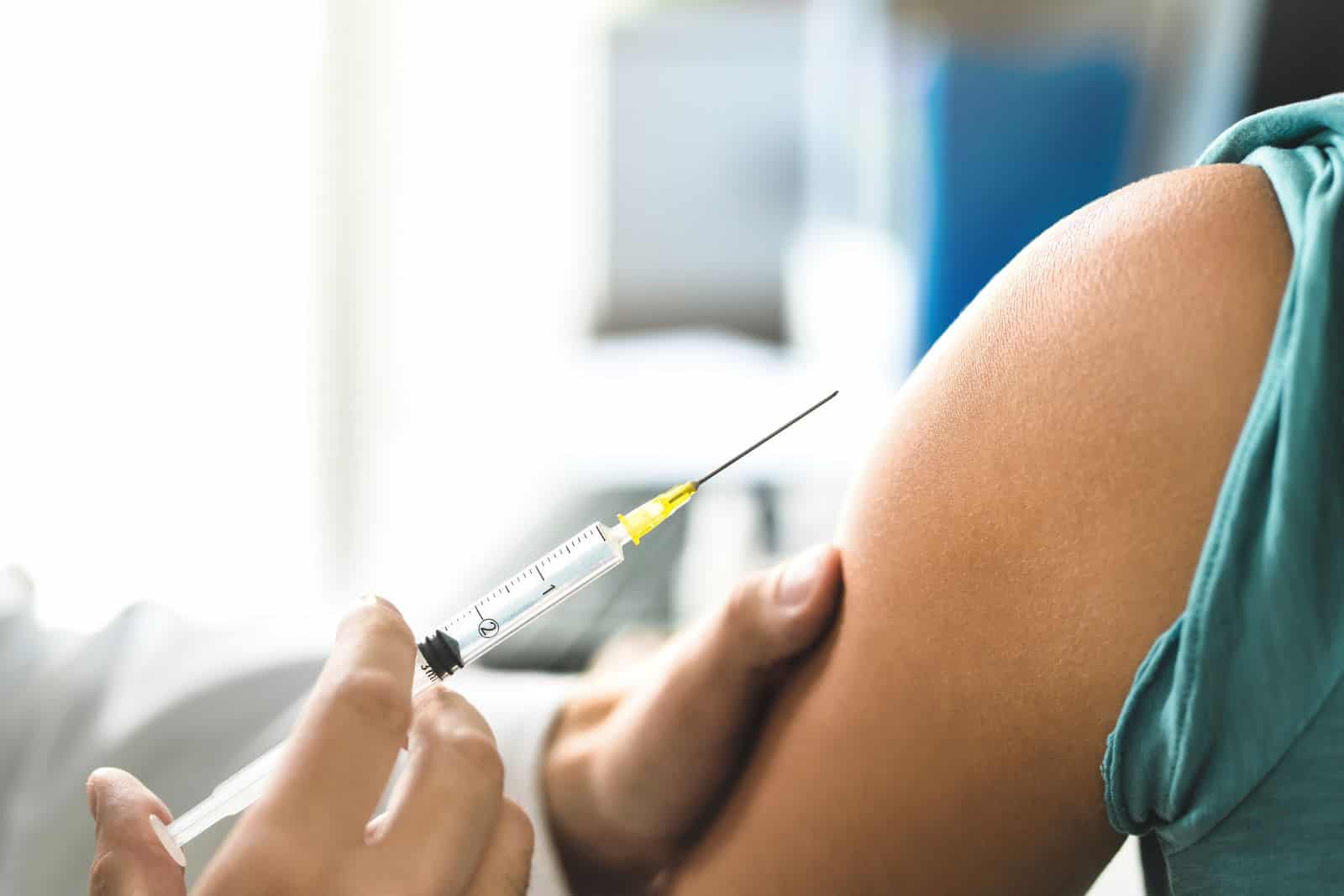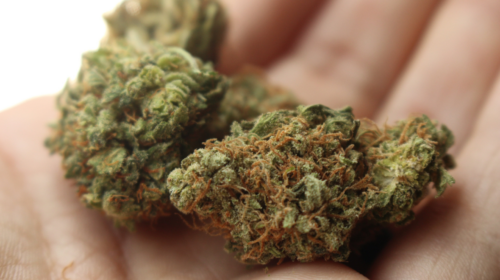Vivitrol® treatment is effective for people with alcohol dependence, reducing heavy drinking or binging days by 25% when given a full dose on a regular basis.[1] For some patients, it’s also used to treat opioid dependence. Vivitrol® is used as part of a medication-assisted treatment program alongside inpatient or outpatient therapy and support groups.

What Is Vivitrol®?
Alcohol use is attributed to more than 80,000 deaths in the United States every year. And, one-fifth of adults binge drink, leading to well-studied health issues and conditions.[2]
Vivitrol®, the brand name for naltrexone, is an extended-release injection treatment for alcohol and substance use disorders. The effects last up to four weeks before your healthcare provider provides another shot. As an opioid antagonist, Vivitrol® binds to the opioid receptors in your brain, blocking the euphoria and sedative effects caused by alcohol and opioids.
It was approved in 2006 by the Food and Drug Administration for alcohol use disorder relapse prevention. Since then, it’s also been used for opioid use disorder treatment. A less commonly used oral formulation of naltrexone has been available for nearly three decades. However, Vivitrol® isn’t a stand-alone treatment; patients generally see the best results when it’s combined with individual and group therapy and other traditional rehab programs.
Vivitrol® Shot For Alcohol: What Is It Used For?
This medication-assisted recovery treatment has several uses and benefits for substance use disorders and co-occurring disorders.
Vivitrol® Shots For Alcohol Addiction and Alcohol Use Disorder (AUD)
People with an alcohol use disorder don’t need to fully detox before receiving Vivitrol® — it can curb the euphoria and pleasurable feelings associated with alcohol consumption.[2] It’s generally uncommon for people using Vivitrol® to experience withdrawal symptoms when using it for alcohol dependence.
The primary benefit of Vivitrol® is minimizing the cravings associated with drinking alcohol. It also doesn’t make you or a loved one feel sick if you drink while taking the medication, a vast difference from other alcohol use disorder medications.
Since many people turn to alcohol for the positive feelings related to an endorphin release, it can quickly turn into heavy drinking. Vivitrol® stops endorphins from binding with their receptors, stopping the positive feelings associated with alcohol intoxication. You or a loved one may exhibit signs of intoxication, but the pleasure derivative diminishes over time, and so does the want to drink.
Vivitrol® Shots For Opioid Addiction or Opioid Use Disorder (OUD)
The ongoing opioid epidemic in the U.S. is well-documented as medical and science professionals race to find solutions and effective treatments. Sadly, opioids were responsible for nearly 75% of all drug overdose deaths — 68,630 — in 2020.[3] And among pregnant people, opioid use disorder has quadrupled in recent years.[4]
Vivitrol® isn’t prescribed unless you or your loved one have gone through medically assisted opioid detoxification for at least 7 to 10 days. Because it’s a pure opioid antagonist, naltrexone stops buprenorphine — commonly used during detox — from working and increases opioid withdrawal symptoms.
How Vivitrol® Works
As an opioid antagonist, an intramuscular injection of Vivitrol® binds to your brain’s opioid receptors to block the effects of opioids or alcohol, such as euphoric and pleasurable feelings produced by opioid or alcohol use. While it’s not a substance use cure, Vivitrol® helps you or your loved one stay sober and reduces the cravings often felt for more alcohol.
Medical professionals and scientists believe chemical responses drive reduced cravings, such as increased cortisol levels. Vivitrol® has the potential to reduce the likelihood of relapse for alcohol use disorder sufferers. The hormone supports mood enhancement and motivation, both of which are strong influences for alcohol misuse.
Vivitrol® Vs. Suboxone: What’s The Difference?
Suboxone, the brand name of buprenorphine, is only used for opioid use disorder. It’s also a partial opioid antagonist due to its partial activation of your brain’s opioid receptors.
Because of this, Suboxone should be tapered before stopping use or withdrawal symptoms can return. Due to both medications having opposing mechanisms for the same opioid receptors, Suboxone and Vivitrol® shouldn’t be used at the same time. Always consult your physician before mixing medications or making changes to your dosage.
Vivitrol® vs. Dolophine®: What’s The Difference?
Dolophine®, a brand name for a synthetic form of methadone, is used in medication-assisted treatment for opioid use disorder. It works by reducing withdrawal symptoms and blocking euphoric effects often found with opiate use.
Dolophine® needs to be taken daily and with doctor or healthcare provider supervision. Its active ingredient makes it a long-acting full opioid antagonist and can cause a relapse or overdose when misused.
Side Effects of Vivitrol®
While it’s usually well-tolerated by people who use it, common side effects of Vivitrol® include:
- Appetite loss or decreased appetite;
- Anxiety;
- Decreased sex drive;
- Dizziness;
- Headache;
- High blood pressure;
- Irritability;
- Joint pain;
- Muscle aches and cramps;
- Nausea;
- Nervousness;
- Stomach pain;
- Tiredness; and/or
- Vomiting
Vivitrol® Warnings and Risks
Vivitrol® shouldn’t be used by anyone presenting any or all of the following circumstances:
- Actively using illicit opioids;
- Receiving opioid analgesics for medical conditions; and/or
- Undergoing opioid withdrawal.
It can cause serious to severe side effects, including major allergic reactions, liver problems, depression, and pneumonia. If you or your loved one haven’t maintained an opioid-free period of at least 7 to 10 days before starting Vivitrol®, you’re at risk of developing Sudden Opioid Withdrawal Syndrome or an opioid overdose.
Let your doctor or healthcare provider know if you have liver problems, hemophilia or other bleeding problems, and/or kidney issues.
Also, no studies have been done regarding the effects of Vivitrol® when used during pregnancy or while breastfeeding. Speak with your doctor or healthcare provider before using Vivitrol®.

Vivitrol® Treatment
Vivitrol® isn’t a cure but it can be helpful in the treatment of alcohol use disorder. A qualified healthcare professional gives a 380-milligram intramuscular injection once a month, or in four-week intervals, into your buttocks with a specialized needle. Naltrexone, the active ingredient, releases slowly into your bloodstream and curbs alcohol cravings over time.
It’s recommended to carry written information about your Vivitrol® use at all times. In an emergency situation, the information can help medical personnel provide appropriate treatment. If you or a loved one miss a Vivitrol® injection appointment, contact your doctor or healthcare provider as soon as possible to schedule another appointment.
While it’s a great medication-assisted treatment option for many people, Vivitrol® needs to be used in conjunction with counseling, mental health treatment, and inpatient and outpatient therapy in professional settings. Ask your healthcare provider if Vivitrol® treatment is a good fit for your alcohol or substance use disorder.
Frequently Asked Questions About Vivitrol® Shots
How Fast Does Vivitrol® Work?
Vivitrol® begins to work on the day of injection, with the peak amount in your bloodstream around two hours after. It slowly releases the remaining dosage amount during the next four weeks.
Does Vivitrol® Cause Weight Gain?
Generally, no, but it can happen.
Can You Get The Vivitrol® Shot While Pregnant?
It’s recommended to speak with your doctor or healthcare provider as current research is inconclusive regarding safety when pregnant or breastfeeding.
Can You Take Suboxone And Vivitrol® Together?
It’s not recommended. Because Suboxone is a buprenorphine and naloxone combination, Vivitrol® inhibits the effects of Suboxone.
Can You Drink On Vivitrol®?
It’s strongly not recommended. The medication and alcohol don’t have any known interactions or side effects that require medical attention. But drinking while on Vivitrol® might reduce how intoxicated you feel and potentially cause you to drink more.
How Long Does Vivitrol® Last?
The extended-release injectable lasts up to four weeks.
Is Vivitrol® A Controlled Substance?
No. It has Food and Drug Administration (FDA) approval and is regulated by the federal agency.
Can You Overdose On Vivitrol®?
Yes. If taken for an opioid use disorder, Vivitrol®, or naltrexone, blocks the pleasing effects of opioids which causes some users to take more of the substance to achieve the desired effect.
Does Vivitrol® Show On A Drug Test?
Most standard drug tests won’t pick up Vivitrol®, but if it does, its FDA approval offers protection under the Americans with Disabilities Act when taken or used as prescribed.
How Long Do Vivitrol® Side Effects Last?
Side effects from Vivitrol® are generally mild and resolve within a few days or weeks. People who take it often experience:
- Anxiety;
- Dizziness;
- Fatigue;
- Headache;
- Rash;
- Sleep disturbances; and/or
- Soreness around the injection site.
If any of these side effects, or others, last beyond the general timeframe, contact your doctor or healthcare provider immediately.
Learn More About Vivitrol® Treatment At One Of Our Central And Eastern U.S. Locations
Alcohol use dependence can develop at any time in life. If you or a loved one engage in heavy drinking or binge drinking on a regular basis, Vivtrol may be able to help. Recovery Unplugged uses music and evidence-based practices to help patients recover from alcohol use disorder. Contact us today to learn more about our range of mental health services.
























